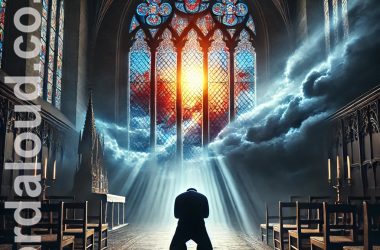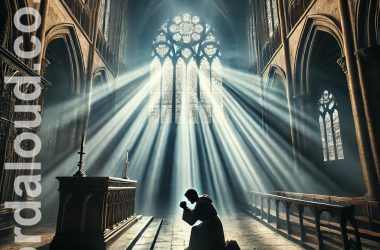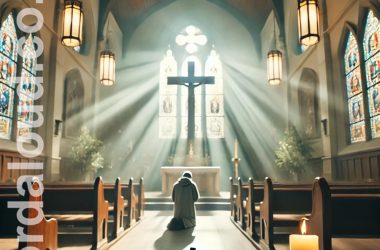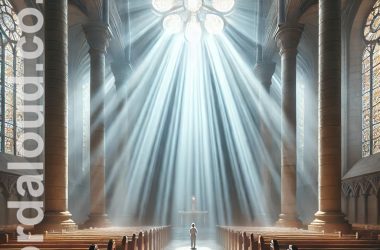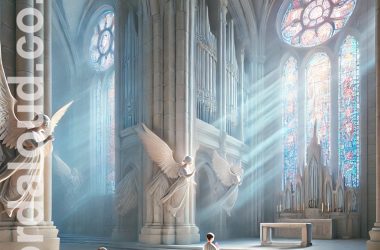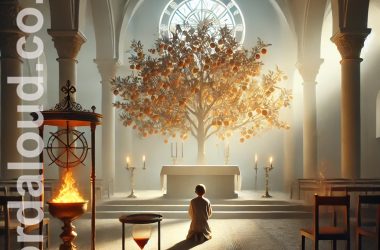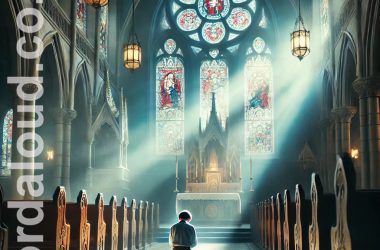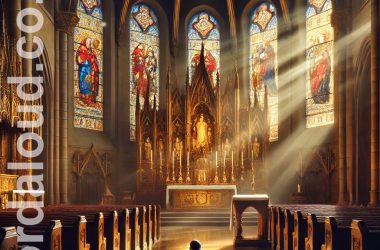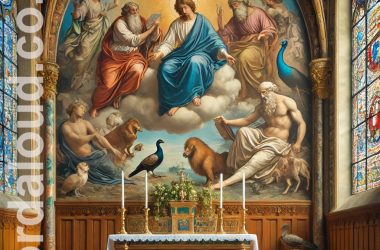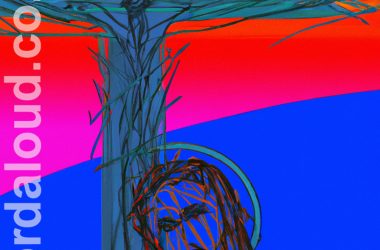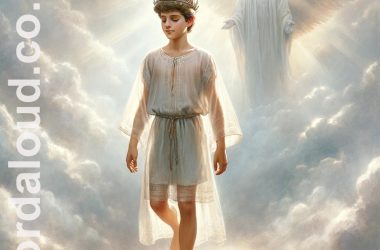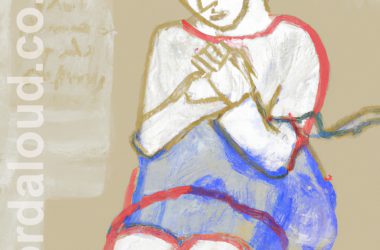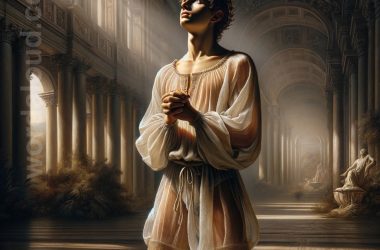In this poem, Herbert reflects on the immense and transcendent nature of God compared to limitations of human experience. The poem explores Herbert’s yearning fully to experience divine love and presence, while grappling with inevitable fluctuations of human faith and emotion. Herbert expresses a wish permanently to feel the closeness and joy sometimes sensed in God’s presence. Yet, this experience is shown to be inconsistent, varying between moments of near-heavenly insight and others of despair, represented as ‘falling to hell’ [ … ]
Poems With Jesus | Christian Faith In Poetry
William Blake | From Milton | Jerusalem | Christian Poems
William Blake’s ‘Jerusalem’ is a visionary poem taken from Milton: A Poem, one of Blake’s prophetic works. Though often associated with patriotism, the poem is more complex than a simple celebration of England. It expresses a deep anxiety about the spiritual and moral state of the nation, contrasting an idealized past with the corrupted present. Blake imagines a divine England, once touched by the presence of Christ, now overshadowed by oppressive forces that must be resisted through a struggle of the mind and spirit. The poem follows a regular structure of four quatrains with an ABAB rhyme scheme, and its meter, largely iambic tetrameter, gives it the quality of a hymn or a rallying cry [ … ]
Fern Hill By Dylan Thomas | A Poem Of Memory, Time, And Loss Of Innocence | Christian Poems
Dylan Thomas’s Fern Hill is among the most charged and evocative meditations on childhood in modern poetry. Written in Thomas’s lyrical style, the poem expresses such joy and wonder associated with youth, only to reveal—gradually and with emotion—the passage of time. Fern Hill is not just a nostalgic recollection of a personal past; it is an elegy for innocence and inevitable transition from youthful bliss to sobering awareness of mortality, which nonetheless affirms an immortality of the childhood experience, which continues to sing through the very act of reading the poem [ … ]
John Donne | Holy Sonnets | At The Round Earth’s Imagined Corners | Christian Poems | Metaphysical Poetry
The poem speaks within the tradition of Christian eschatology, drawing on imagery of the Last Judgment as found in the Book of Revelation. The opening command, ‘At the round earth’s imagin’d corners, blow / Your trumpets, angels,’ invokes the apocalyptic vision of angels summoning the dead from the four corners of the world. The imperative verb ‘blow’ places Donne in a position of assumed authority, yet the command is not sustained. The invocation of cosmic forces collapses into a more personal meditation on sin, repentance, and divine grace [ … ]
George Herbert | The Temple | Affliction (4) | Christian Poems | Metaphysical Poetry
George Herbert’s Affliction (4) explores a personal and spiritual journey marked by expectation, suffering, and ultimate resignation to God’s will. The poem follows Herbert’s movement from early enthusiasm and joy in his relationship with God to a period of deep suffering and questioning, before finally arriving at a state of reluctant submission. The structure and language of the poem reflect the volatility of this experience, capturing shifts in mood and understanding as Herbert struggles with divine providence [ … ]
John Donne | Holy Sonnets | What If This Present Were The World’s Last Night? | Christian Poems | Metaphysical Poetry
The poem confronts the possibility of the world’s last night, situating Donne in a moment of existential urgency. The question is not abstract but immediate: ‘What if this present were the world’s last night?’ Donne directs the soul inward, urging it to consider the image of Christ crucified and assess whether his suffering face inspires fear. The poem explores the contrast between divine justice and mercy, questioning whether judgment should be understood in terms of terror or compassion [ … ]
John Donne | Holy Sonnets | Batter My Heart, Three-Personed God | Christian Poems | Metaphysical Poetry
John Donne’s Holy Sonnet 14, beginning, ‘Batter my heart, three-person’d God,’ enacts a struggle between divine grace and human resistance, expressed through forceful imagery and paradox. The speaker does not ask for gentle persuasion but for a radical upheaval of the self. The poem presents a mind at war with itself, aware of divine sovereignty yet bound by sin, seeking liberation through subjugation [ … ]
George Herbert | The Temple | The Pearl | Church | Christian Poems | Metaphysical Poetry
George Herbert’s poem reflects a spiritual reckoning with limitations of human pursuits in comparison to the inexhaustible worth of divine love. Herbert moves through an intricate meditation on human achievement—learning, honour, and pleasure—before affirming God as the ultimate object of devotion. The poem’s intellectual rigor and devotional focus are balanced by its reflective tone, and its structure underscores a process of realization: worldly endeavours, no matter how noble, ultimately fall short of the divine [ … ]
George Herbert | The Temple | Virtue | Church | Christian Poems | Metaphysical Poetry
George Herbert’s ‘Virtue’ explores themes of mortality, impermanence, and spiritual endurance through a sequence of images drawn from the natural world. The poem juxtaposes transient beauty of nature with the enduring nature of a virtuous soul, reflecting a theological worldview centred on the Christian understanding of eternal life [ … ]
George Herbert | The Temple | Lent | Church | Christian Poems | Metaphysical Poetry
George Herbert’s poem ‘Lent’ reflects theological and ethical principles underlying the Christian practice of fasting. The poem emphasizes self-discipline, spiritual reflection, and the redirection of personal resources toward charity, situating these practices within the broader context of Christian obedience and devotion [ … ]
George Herbert | The Temple | Vanitie (1)| Church | Christian Poems | Metaphysical Poetry
George Herbert’s poem explores humanity’s relentless pursuit of knowledge and mastery over the natural world, juxtaposing these achievements with the failure to recognize and embrace God’s immediate presence. The poem is structured around vivid images of human ingenuity, drawing on the astronomer, diver, and chemist (or ‘chymick’) as archetypes of humanity’s intellectual and physical endeavors. Yet, beneath these triumphs lies a critique: the neglect of the divine, who resides ‘at hand’ rather than in the distant realms humanity seeks to conquer [ … ]
George Herbert | The Temple | Our Life Is Hid With Christ In God (Colossians 3:3)| Church | Christian Poems | Metaphysical Poetry
George Herbert meditates on dual nature of human life, aligning life’s movements with the sun’s dual motion. This interplay of the physical and spiritual mirrors central theological concerns of the 17th century, particularly the relationship between earthly existence and pursuit of eternal salvation [ … ]
George Herbert | The Temple | The World | Church | Christian Poems | Metaphysical Poetry
George Herbert’s ‘Love Built a Stately House’ is an allegorical poem exploring themes of divine grace, human fallibility, and spiritual struggle between sin and redemption. The poem uses the metaphor of a grand house to represent the soul and its vulnerability to the forces of Fortune, Pleasure, Sin, and ultimately, divine restoration through Love and Grace [ … ]
Gerard Manley Hopkins| The Windhover | Christian Poems
The Windhover by Gerard Manley Hopkins is a richly layered poem exploring the beauty of a kestrel in flight, while presenting a complex meditation on spiritual revelation, self-sacrifice, and divine glory. Hopkins dedicates the poem ‘To Christ our Lord’, indicating that the bird’s physical mastery mirrors the divine majesty of Christ [ … ]
George Herbert | The Temple | Sighs and Grones | Church | Christian Poems | Metaphysical Poetry
The poem offers Herbert’s desperate plea for divine mercy, structured as a series of direct appeals to God. The repeated cries of ‘O do not’ introduce a layered exploration of sin, justice, and grace, where Herbert acknowledges personal failure while seeking deliverance [ … ]
George Herbert | The Temple | Ungratefulnesse| Church | Christian Poems | Metaphysical Poetry
The poem explores the relationship between divine generosity and human reluctance, presenting a meditation on God’s revelation and humanity’s limited response. Herbert uses the metaphor of two ‘cabinets’ filled with treasure to describe God’s ultimate gifts to humanity: the Trinity and the Incarnation. These cabinets symbolize the profound mysteries of divine nature and Christ’s embodiment, emphasizing both spiritual wealth and revelation [ … ]
George Herbert | The Temple | Christmas | Church | Christian Poems | Metaphysical Poetry
The poem presents a spiritual progression from weariness and disconnection to renewed purpose and communion with the divine. Herbert describes a personal journey marked by exhaustion, seeking rest after being drawn away by worldly pleasures. Imagery of travel, with Herbert and his horse both ‘tired, body and mind’, introduces a state of spiritual depletion. The search for respite in an inn, a place of temporary shelter, symbolizes the soul pausing in its pursuit of lasting fulfillment. The moment of pause becomes transformative, as Herbert unexpectedly encounters Christ, described as ‘my dearest Lord’, waiting as a silent presence, ready to offer comfort once the grief brought by pleasures subsides [ … ]
George Herbert | The Temple | Deniall | Church | Christian Poems | Metaphysical Poetry
This poem reflects an intense and deeply personal experience of spiritual desolation, longing, and eventual hope for renewal. Herbert describes a state of spiritual barrenness, where prayer seems to fail in reaching God, leaving the soul in turmoil and disarray. The journey unfolds through an exploration of frustration, despair, and a heartfelt plea for divine intervention [ … ]
George Herbert | The Temple | Employment (2) | Church | Christian Poems | Metaphysical Poetry
The poem explores the transitory nature of human life and its obligations within the framework of divine order. The poem contrasts rest and action, reflecting on a tension between weariness and demands of purposeful living. The opening line of the poem establishes a choice: to rest or to engage. The speaker’s – Herbert’s soul rejects passivity and expresses a desire to act, reflecting a concern with spiritual stagnation [ … ]
George Herbert | The Temple | To All Angels And Saints | Church | Christian Poems | Metaphysical Poetry
The poem explores themes of worship, reverence, and obedience to divine authority. The poem religious tensions of the Reformation era. It expresses Herbert’s struggle with the practice of venerating saints and Mary, this with an unwavering commitment to Christ’s commands. Herbert knows truth, and yet refrains from seeking angels’ and saints’ intercession, with the thought that all worship belongs solely to God [ … ]
George Herbert | The Temple | Avarice | Church | Christian Poems | Metaphysical Poetry
Herbert’s ‘Avarice’ critiques humanity’s obsession with wealth by tracing money’s journey from its origins to its corrupting influence on human values. The poem is structured as a meditation, moving from the origins of money to its transformation and eventual dominance over human life [ … ]
George Herbert | The Temple | Sunday Church | Christian Poems | Metaphysical Poetry
Herbert’s poem celebrates Sunday as a day set apart, a divine gift imbued with rest, renewal, and redemption. Sunday is portrayed as both a temporal sanctuary and a spiritual gateway, lifting the believer from earthly toil to heavenly contemplation. The poem’s intricate structure mirrors its thematic duality: Sunday is simultaneously rooted in the physical rhythms of the week and oriented toward eternal life [ … ]
George Herbert | The Temple | The Starre | Church | Christian Poems | Metaphysical Poetry
The poem is an address to the Holy Spirit, symbolized as fire or a spark, exploring themes of divine transformation, purification, and ultimate union with God. Herbert opens with an acknowledgment of the Spirit’s divinity, emanating from the presence of the Saviour’s face. The Spirit is seen as belonging naturally to this celestial realm, yet the poet invites the Spirit to ‘take a bad lodging’ in his heart, reflecting humility and recognition of his own imperfections [ … ]
George Herbert | The Temple | Affliction (3)| Church | Christian Poems | Metaphysical Poetry
The poem explores relationship between human grief and divine presence. The poem opens with an image of the heart heaving, which leads Herbert to recognize God’s role in guiding sorrow. This recognition transforms grief from chaos into something governed. The rod of suffering becomes a scepter, suggesting authority and purpose in the experience of pain. Without God’s involvement, Herbert believes his grief would have overwhelmed him entirely [ … ]
George Herbert | The Temple | The Church | Constancie | Christian Poems | Metaphysical Poetry
This poem explores characteristics of the ‘honest man’, presenting him as an ideal figure who embodies integrity, constancy, and compassion. Through a series of tightly crafted six-line stanzas, Herbert develops a portrait of this moral archetype, contrasting his steadfast virtues with instability and corruption of the world around him [ … ]
George Herbert | The Temple | The Church | Frailtie | Christian Poems | Metaphysical Poetry
The poem is an introspective dialogue in which Herbert contemplates a tension between worldly values and divine realities. The poem opens with an expression of disdain for the superficial trappings of honour, wealth, and beauty. These are dismissed as transient, ‘fair dust’ that, despite their allure, amount to no more than ‘gilded clay’ or ‘fine grass or hay’. This imagery diminishes worldly achievements and possessions, positioning them beneath Herbert’s spiritual footing as something to be trodden upon rather than exalted [ … ]
George Herbert | The Temple | The Church | Humilitie | Christian Poems | Metaphysical Poetry
The poem describes a vivid allegory in which the Virtues are portrayed as a courtly assembly, seated in an orderly hierarchy, with Humility occupying the lowest but most crucial position. The scene is set on an ‘azure throne’, emphasizing the elevated and celestial nature of these qualities. Around this throne, animals and birds bring symbolic tokens, illustrating their inherent traits and how these can be transformed or appropriated by the Virtues. The interplay between the virtues, the animals, and the chaos that ensues offers a meditation on the delicate harmony required to maintain moral order, the dangers of pride and discontent, and the reconciling power of humility [ … ]
George Herbert | The Temple | The Church | The Quidditie | Christian Poems | Metaphysical Poetry
This poem meditates on the nature and purpose of a ‘verse’, emphasizing simplicity and spiritual focus. Herbert frames the verse not as grand poetry or artistic achievement but as a humble, personal offering to God. By reflecting on what a verse is not, Herbert situates the act of writing in a starkly different realm from that of worldly pursuits or markers of success. Humility embedded in the term ‘verse’, which can mean a single line or small unit of expression, underscores the poet’s theological concerns: how the simplest acts, when directed toward God, can acquire immense spiritual value [ … ]
George Herbert | The Temple | The Church | Content| Christian Poems | Metaphysical Poetry
Herbert’s poem unfolds as meditation on inner peace and spiritual discipline, crafted through precise imagery and reflective admonition. Herbert begins with a command to restless thoughts, urging them to remain within confines of their own being. This invocation sets the tone for the poem as both a prayer and an internal dialogue, where the soul seeks to reconcile its innate restlessness with a divine imperative for order and calm. This act of addressing thoughts directly implies their unruliness, underscoring tension between human inclination toward distraction and spiritual call to stillness [ … ]
George Herbert | The Temple | The Church | Trinitie Sunday| Christian Poems | Metaphysical Poetry
The poem reflects on human relationship with God through three key dimensions: creation, redemption, and sanctification. Each stanza builds on this progression, portraying Herbert’s journey from origins in divine creation to ultimate aspiration of resting with God. The poem is spare yet purposeful, mirroring simplicity of the poem’s theological focus [ … ]
George Herbert | The Temple | The Church | The Windows| Christian Poems | Metaphysical Poetry
Herbert’s poem focuses on themes of divine grace, human frailty, and the role of a preacher as a vessel for God’s light and truth. The poem is built around the metaphor of a preacher as a glass window through which God’s grace and truth can shine. It explores how the preacher’s life and message must be unified effectively to convey God’s word to others [ … ]
George Herbert | The Temple | The Church | The Church-Floore | Christian Poems | Metaphysical Poetry
The poem describes a metaphorical interior of a sacred space. This symbolizes a concept of the human heart as a temple built by God. Each element of the architecture serves as an allegory for spiritual virtues, struggles, and the divine influence in maintaining the integrity of the space. The poet weaves a contemplative vision that ties physical imagery to theological themes [ … ]
George Herbert | The Temple | The Church | Church-Lock And Key | Christian Poems | Metaphysical Poetry
The poem reflects George Herbert’s characteristic preoccupation with the nature of sin, divine grace, and human helplessness in the face of God’s justice and mercy. The poem is a layered meditation on spiritual struggle to reconcile personal sinfulness with the hope of redemption [ … ]
George Herbert | The Temple | The Church | Church-Musick | Christian Poems | Metaphysical Poetry
The poem meditates on a relationship with God, this explored through themes of transcendence, vulnerability, and search for spiritual guidance. Herbert begins with an expression of gratitude, addressing this divine presence as ‘sweetest of sweets’. This epithet evokes an almost sensual intimacy, suggesting a deeply personal connection with God, who offers relief and solace. God’s intervention is characterized as rescuing Herbert from bodily and mental distress and transporting him to a ‘house of pleasure’ and ‘dainty lodging’. These phrases conjure images of refuge and spiritual elevation, positioning God as nurturer and healer who offers sanctuary from life’s tribulations [ … ]
George Herbert | The Temple | The Church | Church Monuments | Christian Poems | Metaphysical Poetry
The poem meditates on mortality, the ephemeral nature of the human body, and spiritual preparation required for the inevitability of death. Herbert, addressing the relationship between the soul and body, deliberately ‘entombs’ the flesh in acknowledgment of its temporal nature, using the act as an opportunity to reflect on its destiny: to return to dust. This act of entombment is not literal but symbolic, serving as a lesson in humility and a call to align oneself with a spiritual reality that transcends physical existence [ … ]
George Herbert | The Temple | The Church | Even-song (1)| Christian Poems | Metaphysical Poetry
This poem is a meditation on gratitude and divine love, exploring relationship between human activity and God’s continuous care. George Herbert reflects on the gifts of life, sight, and the ability to engage in both labour and leisure, attributing them to God’s love. Yet, the central focus is the greater blessing of spiritual vision, symbolized by sight, which God withheld from himself—we may understand reference to Christ’s sacrifice—so that humanity might see its own paths and be redeemed [ … ]
George Herbert | The Temple | The Church | Sinne (2) | Christian Poems | Metaphysical Poetry
The poem explores the nature of sin, the opposition to God of sin, and the paradoxical ways in which humans perceive evil. Herbert reflects on sin as a force that contrasts with the divine, but also acknowledges that sin has a presence in the world that may hold some form of goodness, suggesting a complexity in its nature. The first stanza raises the idea that while sin is in opposition to God, it may still contain elements that are, at least partially, good, challenging simplistic moral dichotomies [ … ]
George Herbert | The Temple | The Church | Mattens | Christian Poems | Metaphysical Poetry
The poem reflects an intimate conversation between the poet and God, exploring the nature of human devotion, the human heart, and divine presence. It begins with Herbert’s realization that God is present from the very moment Herbert opens his eyes each morning, indicating God’s constant vigilance and readiness to connect with the human soul. This immediate presence of God suggests that each day is a fresh opportunity for a ‘match’ or covenant, where both God and the poet engage in a continuous relationship of devotion and acknowledgment [ … ]






